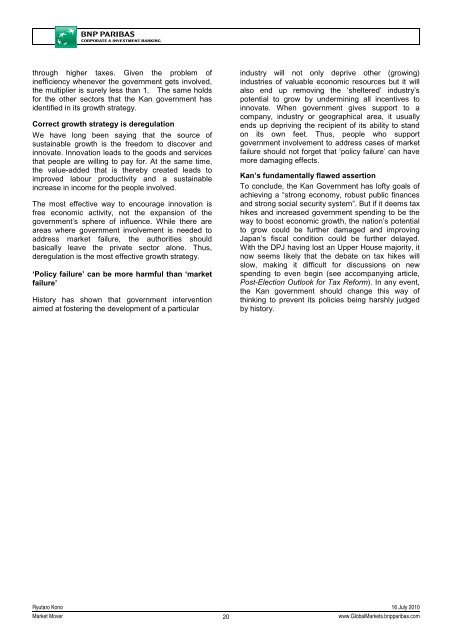Market Economics | Interest Rate Strategy - BNP PARIBAS ...
Market Economics | Interest Rate Strategy - BNP PARIBAS ...
Market Economics | Interest Rate Strategy - BNP PARIBAS ...
You also want an ePaper? Increase the reach of your titles
YUMPU automatically turns print PDFs into web optimized ePapers that Google loves.
through higher taxes. Given the problem of<br />
inefficiency whenever the government gets involved,<br />
the multiplier is surely less than 1. The same holds<br />
for the other sectors that the Kan government has<br />
identified in its growth strategy.<br />
Correct growth strategy is deregulation<br />
We have long been saying that the source of<br />
sustainable growth is the freedom to discover and<br />
innovate. Innovation leads to the goods and services<br />
that people are willing to pay for. At the same time,<br />
the value-added that is thereby created leads to<br />
improved labour productivity and a sustainable<br />
increase in income for the people involved.<br />
The most effective way to encourage innovation is<br />
free economic activity, not the expansion of the<br />
government’s sphere of influence. While there are<br />
areas where government involvement is needed to<br />
address market failure, the authorities should<br />
basically leave the private sector alone. Thus,<br />
deregulation is the most effective growth strategy.<br />
‘Policy failure’ can be more harmful than ‘market<br />
failure’<br />
History has shown that government intervention<br />
aimed at fostering the development of a particular<br />
industry will not only deprive other (growing)<br />
industries of valuable economic resources but it will<br />
also end up removing the ‘sheltered’ industry’s<br />
potential to grow by undermining all incentives to<br />
innovate. When government gives support to a<br />
company, industry or geographical area, it usually<br />
ends up depriving the recipient of its ability to stand<br />
on its own feet. Thus, people who support<br />
government involvement to address cases of market<br />
failure should not forget that ‘policy failure’ can have<br />
more damaging effects.<br />
Kan’s fundamentally flawed assertion<br />
To conclude, the Kan Government has lofty goals of<br />
achieving a “strong economy, robust public finances<br />
and strong social security system”. But if it deems tax<br />
hikes and increased government spending to be the<br />
way to boost economic growth, the nation’s potential<br />
to grow could be further damaged and improving<br />
Japan’s fiscal condition could be further delayed.<br />
With the DPJ having lost an Upper House majority, it<br />
now seems likely that the debate on tax hikes will<br />
slow, making it difficult for discussions on new<br />
spending to even begin (see accompanying article,<br />
Post-Election Outlook for Tax Reform). In any event,<br />
the Kan government should change this way of<br />
thinking to prevent its policies being harshly judged<br />
by history.<br />
Ryutaro Kono 16 July 2010<br />
<strong>Market</strong> Mover<br />
20<br />
www.Global<strong>Market</strong>s.bnpparibas.com
















